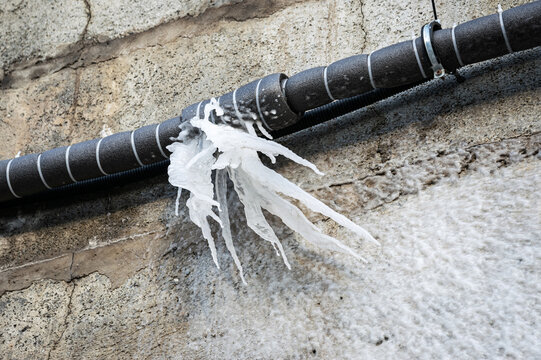Ways to Defend Your Plumbing from Freezing: Critical Tips
Ways to Defend Your Plumbing from Freezing: Critical Tips
Blog Article
Any individual has got their own individual ideas with regards to 6 Ways to Prevent Frozen Pipes.

Cold weather can wreak havoc on your pipes, especially by freezing pipelines. Here's how to prevent it from happening and what to do if it does.
Intro
As temperature levels drop, the threat of frozen pipes boosts, possibly leading to expensive fixings and water damages. Understanding exactly how to prevent icy pipes is critical for property owners in chilly environments.
Prevention Tips
Protecting susceptible pipes
Cover pipelines in insulation sleeves or utilize heat tape to shield them from freezing temperatures. Concentrate on pipelines in unheated or external locations of the home.
Home heating strategies
Maintain indoor spaces adequately heated, specifically locations with plumbing. Open up cupboard doors to enable warm air to flow around pipelines under sinks.
Exactly how to determine frozen pipes
Search for reduced water circulation from taps, uncommon odors or sounds from pipes, and noticeable frost on subjected pipes.
Long-Term Solutions
Structural changes
Think about rerouting pipes far from exterior walls or unheated areas. Include added insulation to attic rooms, basements, and crawl spaces.
Upgrading insulation
Purchase high-quality insulation for pipes, attics, and wall surfaces. Proper insulation helps preserve constant temperature levels and reduces the risk of frozen pipelines.
Safeguarding Outside Plumbing
Garden pipes and exterior taps
Separate and drain pipes garden hoses prior to winter months. Set up frost-proof spigots or cover exterior taps with insulated caps.
Understanding Icy Pipes
What causes pipelines to freeze?
Pipelines ice up when subjected to temperature levels below 32 ° F (0 ° C) for extended durations. As water inside the pipes freezes, it broadens, taxing the pipeline wall surfaces and possibly causing them to burst.
Dangers and damages
Frozen pipes can lead to supply of water interruptions, residential or commercial property damage, and expensive repair services. Burst pipes can flood homes and create comprehensive structural damage.
Indications of Frozen Pipeline
Determining frozen pipes early can stop them from rupturing.
What to Do If Your Pipes Freeze
Immediate activities to take
If you believe frozen pipelines, maintain faucets available to ease pressure as the ice thaws. Use a hairdryer or towels soaked in warm water to thaw pipelines gradually.
Verdict
Avoiding icy pipelines needs positive measures and fast feedbacks. By recognizing the causes, indicators, and preventive measures, property owners can shield their plumbing during winter.
Helpful Tips to Prevent Frozen Pipes this Winter
UNDERSTANDING THE BASICS: WHY PIPES FREEZE AND WHY IT’S A PROBLEM
Water freezing inside pipes is common during the winter months, but understanding why pipes freeze, and the potential problems it can cause is crucial in preventing such incidents. This section will delve into the basics of why pipes freeze and the associated problems that may arise.
THE SCIENCE BEHIND FROZEN PIPES
When water reaches freezing temperatures, it undergoes a physical transformation and solidifies into ice. This expansion of water as it freezes is the primary reason pipes can burst. As the water inside the pipe freezes, it expands, creating immense pressure on the walls. If the pressure becomes too great, the pipe can crack or rupture, leading to leaks and water damage.
FACTORS THAT CONTRIBUTE TO PIPE FREEZING
Low Temperatures: Extremely cold weather, especially below freezing, increases the risk of pipes freezing. Uninsulated or Poorly Insulated Pipes: Pipes located in unheated areas, such as basements, crawl spaces, or attics, are more prone to freezing. Insufficient insulation or lack of insulation altogether exacerbates the problem. Exterior Wall Exposure: Pipes running along exterior walls are susceptible to freezing as they encounter colder temperatures outside. Lack of Heating or Temperature Regulation: Inadequate heating or inconsistent temperature control in your home can contribute to frozen pipes. PROBLEMS CAUSED BY FROZEN PIPES
- Pipe Bursting: As mentioned earlier, the expansion of water as it freezes can cause pipes to burst, resulting in significant water damage.
- Water Damage: When pipes burst, it can lead to flooding and water damage to your property, including walls, ceilings, flooring, and personal belongings.
- Structural Damage: Prolonged exposure to water from burst pipes can compromise the structural integrity of your home, leading to costly repairs.
- Mold and Mildew Growth: Excess moisture from water damage can create a favorable environment for mold and mildew growth, posing health risks to occupants.
- Disrupted Water Supply: Frozen pipes can also result in a complete or partial loss of water supply until the issue is resolved.
WHY CERTAIN PIPES ARE MORE PRONE TO FREEZING
- Location: Pipes located in unheated or poorly insulated areas, such as basements, crawl spaces, attics, or exterior walls, are at higher risk of freezing.
- Exterior Pipes: Outdoor pipes, such as those used for irrigation or exposed plumbing, are particularly vulnerable to freezing as they are directly exposed to the elements.
- Supply Lines: Pipes that carry water from the main water supply into your home, including the main water line, are critical to protect as freezing in these lines can affect your entire plumbing system.
- Underground Pipes: Pipes buried underground, such as those connected to sprinkler systems or outdoor faucets, can be susceptible to freezing if not properly insulated.
https://busybusy.com/blog/helpful-tips-to-prevent-frozen-pipes-this-winter/

Hopefully you liked our article on Prevent Frozen Pipes . Many thanks for taking the time to browse our post. Don't hesitate to set aside a second to promote this blog if you liked it. Thanks a bunch for your time. Come back soon.
Source Report this page